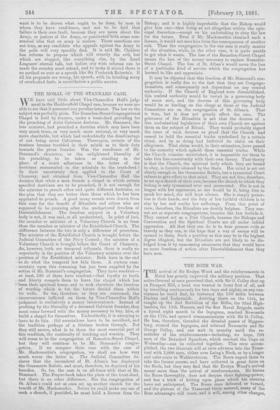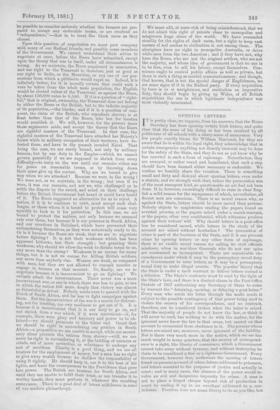THE DOER WAR,
THE arrival of Sir Evelyn Wood and the reinforcements in Natal has greatly improved, the military position. That active General at once perceived that, with Sir G. Colley shut up on Prospect Hill, a head. was wanted in front first of all, and by travelling continuously for two days and nights, on any con- veyance he could find, he traversed the 150 miles between Durban and Ladysmith. Arriving there on the 15th, he caught up the 2nd Battalion of the Rifles, the 92nd High- landers, the 15th Hussars, and the first Naval Brigade, made forced night march to the Ingagana, reached Newcastle on the 17th, and opened communications with Sir G. Colley. He has, therefore; threaded the dreaded passes of Biggers- berg, crossed the Ingagana, and relieved Newcastle and Sir George Colley, and. can wait in security until the re- mainder of the reinforcements—including, we hope, 700 men of the Detached Squadron, which reached the Cape on Wednesday—can be collected together, This once accom- plished, the two Generals will at once advance into the Trans- vaal with 3,000 men, either over Laing's Nock, or by a longer and safer route to Wakkerstroora. The Boers expect them to take the former course, and. have collected in great force on the Neck, but they may find that Sir Evelyn Wood's arrival meant more than the arrival of reinforcements. He knows the Boers thoroughly, does not despise their fighting-power, and has a trick of hitting upon plans which his enemies have not anticipated. The Boers once defeated or turned, and the plateau of the Transvaal fairly entered, many of the Boer advantages will cease, and it will, among other changes,
be possible to consider seriously whether the farmers are pre- pared to accept any endurable terms, or arc resolved on "independence,"—that is, to treat the black races as they choose.
Upon this question of negotiation we must part company with many of our Radical friends, and possibly some members of the Government. We cannot understand their advice to negotiate at once, before the Boers have submitted, except upon the theory that war in itself, under all circumstances, is wrong. As we maintain, the Boers acquiesced in annexation, and our right to the Transvaal is, therefore, just as good as our right to India, or the Mauritius, or any one of our pos- sessions from which a plaiseite would expel us. Indeed, it is
infinitely better, for it is morally certain that could such EL 'vote be taken from the adult male population, the English
would be elected rulers of the Transvaal, as against the Boers, by about 150,000 votes to 6,500. If it is a question of "right- ful," that is original, ownership, the Transvaal does not belong to either the Boers or the British, but to the infinite majority of its population,—the blacks; and if it is a question of con- quest, the claim of the British, who repudiate slavery, is at least better than that of the Boers, who but for treaties would establish it. We will, however, for the present leave those arguments aside, and accept the theory that the Boers are rightful masters of the Transvaal. In that case, the rightful masters of the Transvaal have attacked her Majesty's forces while in military occupation of their territory, have de- feated them, and have in the pursuit invaded Natal. That being the case, we are surely bound, not only by military honour, but by our duty to the Empire—which we cannot govern peacefully if we are supposed to shrink from every difficulty—to carry on the war until our enemies either sue for peace on reasonable terms, or by throwing down their arms give up the contest. Why are we bound to give 'way when we are attacked ? Because we were in the wrong ? We were not, as we maintain, in the wrong ; but even if we were, it was our enemies, and not we, who challenged us to settle the dispute by the sword, and acted on their challenge before the British Government had heard or could have heard of it. The Boers suggested no alternative for us to reject. A nation, if it is to continue to exist, must accept such chal- lenges, or those whom it is bound to protect will cease very speedily to look to it for protection. In this case, we arc, bound to protect the natives, not only because we assumed rule over them, but because it is our presence in South Africa, and our exertions in Zululand, which have prevented their enfranchising themselves, as they were notoriously ready to do. Or is it because the Boers are weak, that we are to negotiate before fighting? It is not their weakness which has been apparent hitherto, but their strength ; but granting their weakness, why should we allow the weak to dictate terms to us, any more than the strong ? Weakness is an excuse for many things, but it is not an excuse for killing British soldiers, any more than anybody else. Women are weak, as compared with men, but they are not allowed to commit murder or
engage in treason on that account. Or, finally, are we to negotiate because it is inconvenient to go on fighting ? We .entirely admit the inconvenience. There never was a more i.nconvement war, or one in which there was less to gain, or one
in which the nation felt more deeply that victory was almost • as distasteful as defeat. Nobody wants even to quarrel with the Dutch of South Africa, and far less to fight campaigns against them. But the inconvenience of the war is a reason for distrust- ing, not for trusting, our own readiness to get out of it. It is because it is inconvenient that it is our duty to go on, and not shrink from a war which, if it were convenient—if, for example, there were glory and territory and power to be ob- tained—we should prosecute to the bitter end. Grant that
we .should be right in surrendering our position in South Africa—a proposition we are unable to accept, while our ascend- ancy alone protects the natives from slavery—still, we can never be right in surrendering it, at the bidding of enemies or rebels, out of mere cowardice, or reluctance to undergo any
sort of sacrifices. Charity is a good thing, and we are all trustees for the employment of money, but a man has no right to give away wealth because he dislikes the responsibility of using it rightly. He should keep it, use it to the best of his lights, and leave the consequences to the Providence that gave him power. The British are trustees for South Africa, and until they are unable to fulfil their trust, or can transfer it to worthy hands, they must perform it, whatever the resulting annoyance. There is a good deal of latent selfishness in some of our modern philanthropy.
We must add, at some risk of being misunderstood, that we do not admit this right of minute clans to monopolise and misgovern huge slices of the world. We have contended steadily for the rights of dark races, but a right to keep vast masses of soil useless to civilisation is not among them. The aborigines have no right to monopolise Australia, or drive white men from the two Americas ; and if they have not, why have the Boers, who are not the original settlers, who are not the majority, and whose idea of government is that no one is to be free, even to sell his labour, except themselves. Con- science ought to control public affairs as well as private, but there is such a thing as morbid conscientiousness ; and though, God knows, that is not the special danger of Englishmen, we see B01120 signs of it in the Radical party. If every acquisition by force is in se unrighteous, and restitution an imperative duty, they should begin by giving up Wales, of all British acquisitions the one in which legitimate independence was most violently terminated.



































 Previous page
Previous page